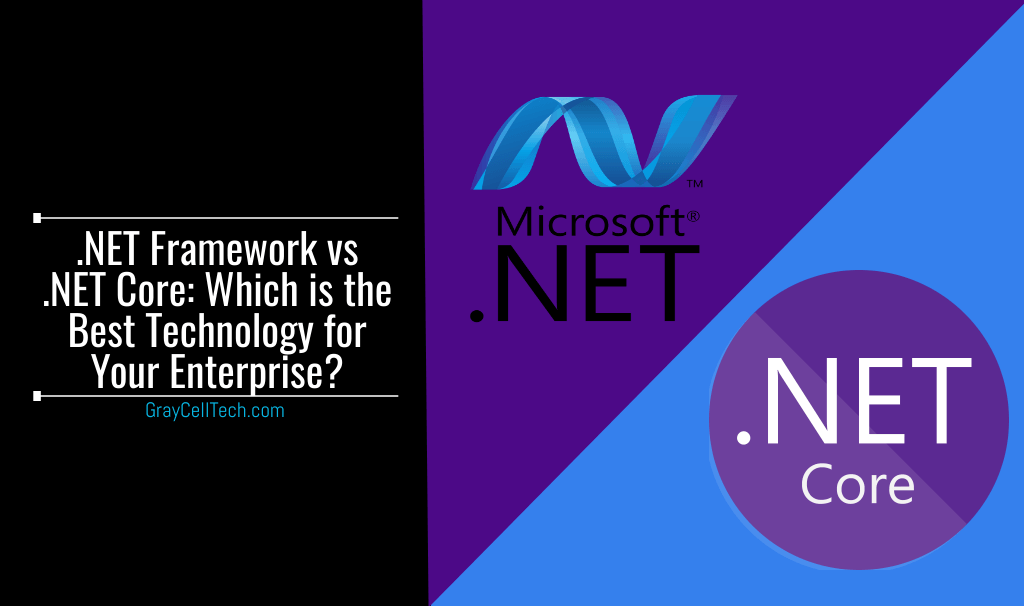To start working on the .NET framework, the foremost question that comes to every developer’s mind is – which platform should be used to start with. If you are among one of them, then this blog is for you. We will explain which one should be your choice .NET framework or .NET core and more importantly, why?
Let’s take a deep dive to understand what they actually are and what should be our choice?
.NET Framework
The .NET Framework (commonly termed as “dot net”) is software development platform built by Microsoft for developing and running a broad range of applications. Just for information seekers, the original name of .NET Framework was Next Generation Windows Service. This cross platform framework accepts large codes in multiple languages that makes it the best fit for developing mobile, desktop and web applications. .NET Framework also has a runtime environment for creating windows apps and web services. Nowadays, it is one of the most popular framework among leading IT giants across the globe. The main goal of creating .NET Framework is to provide an easy to use object oriented environment i.e. supported by several languages that results in making development easier.
The .NET Framework is equipped with two main components:
- Common Language Runtime (CLR): It is responsible for running apps and proving memory management.
- Extensive Class Library: It contains a complete set of tested reusable codes for all stages of a development phase that can be used by a developer.
.NET Core
The introduction of .NET Core as an open source free Microsoft framework with cross-platform usages like Microsoft Windows, Apple MAC operating system and Linux OS was a major landmark in the field of open source technologies. The introduction of DOT NET Core 1.0 opened new gates for development in this field. But the introduction of the third update for Microsoft visual studio 2015 proved to be a milestone as it cleared the path for where .NET Core stands today.

Now, if we move on to the second part, which is the best technology for your enterprise? Then our answer will be, it completely depends upon your requirement. Because both of them (.NET Framework & .NET Core) have their own unique features based on the need and requirements of the project. So it is helpful to know about their important features & limitations so that you can make an informed decision. We will try to cover them under the following points:
- Open Source with Cross-Platform Compatibility
- Deployment Model
- Performance and Scalability
- Library Collection
Open Source With Cross-Platform Compatibility
.NET Framework
- The unique feature or the beauty of .NET Framework is to write codes in one language and compile and access them in another language.
- In early days .NET Framework was under the licensed and proprietary software of Microsoft. But later on certain components of .NET Framework were released as open source by Microsoft.
.NET Core
- Due to its cross platform compatibility it can run on multiple operating systems such as Windows, Mac and Linux platforms.
- This compatibility feature of .NET Core acts as a boon for developers and IT companies to develop cross platform applications and migrate existing applications to another platform quite comfortably.
Deployment Model
.NET Framework
- .NET Framework allows developers to deploy web applications only on internet information servers.
- It provides a feature of Xcopy deployment. This allows developers to copy the files into the directory where they are ready to run. But it is only good for simple applications. For complex apps it becomes complicated.
.NET Core
- Deploying on .NET Core is flexible.
- One of the key feature of .NET Core is that if a new version of .NET is launched then it updates on one machine instantly and instinctively uploads in new directories without affecting the current app.
- Applications can be directly deployed in the cloud by the developer. Developers can create their own hosting process to self-host the application.
Performance Scalability
.NET Framework
- .NET framework can lag in performance
- The .NET Framework compiles the CIL code into executable code using the JIT (Just-In-Time) compiler when the application is launched for the first time. Then, the executable program caches into the .NET Native Image Cache.
- First launch of any .NET application can be increased in speed by using the Native Image Generator to manually compile and cache any .NET application.
.NET Core
- .NET Core is more effective than .NET Framework as .NET as application performance can be boosted by the developers significantly without any use of additional hardware.
- The feature of .NET Core to optimize the compiled code automatically and without any change results as an increase in performance.
Library Collection
.NET Framework
- Developers of .NET Framework can utilize the robust class libraries.
- The class libraries of .NET Framework are helpful in implementing common functionalities. For e.g. reading and writing files, interacting with databases, rendering graphics and manipulating XML documents.
.NET Core
- Apart from having several robust class libraries, .NET Core uses a redesigned CLR (Common Language Runtime) known as CoreCLR.
- Developers have the privilege of using only those libraries that are required by the application. Developers can remove unwanted libraries quite comfortably.
Conclusion
After going through the blog, it is evident that .NET Core provides a lot more benefits to .NET developers and enterprises than .NET Framework. Apart from this, the runtime of .NET Core makes it the first choice of developers to build SPAs (Single Page Applications), especially with React JS.








